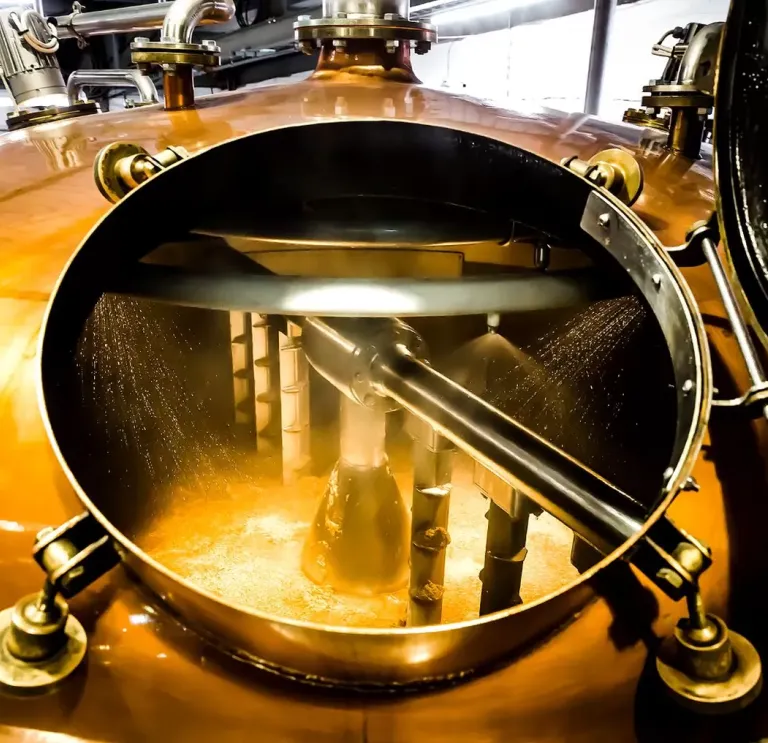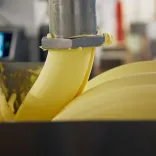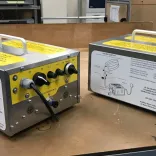Even though Wales is a small nation, a number of innovations emerged from all corners of Welsh life in response to the pandemic. A strong sense of community spirit and collaboration aimed to ease the burden on health services, to prevent the virus spreading, and ultimately to help save lives.
Rapid reactions from the public and private sector led to a number of new initiatives. Many Welsh organisations and businesses completely changed their day-to-day operations to meet the new demands that the pandemic has placed on Wales. The speed of these responses is testament to the flexibility and resilience of our sectors and our communities.
Flexible venues
A number of the largest venues in Wales opened their doors to accommodate the public – but instead of offering entertainment or sport, the venues were turned into field hospitals.
In Llandudno, Venue Cymru was transformed into the first temporary hospital in North Wales. Usually a theatre, conference centre and arena, the venue was transformed to provide 350 beds to support Betsi Cadwaladr University Health Board during the pandemic.
In Cardiff, The National Stadium of Wales (Principality Stadium) – usually a 75k capacity entertainment venue), with its retractable roof, transformed into Ysbyty Calon y Ddraig - Dragon's Heart Hospital. The pitch was covered with one of the largest tents in Europe, which has capacity for over 2,000 patients, freeing up local hospitals to carry on providing ongoing care.
It was designed to be home to sick patients in case local hospitals were overwhelmed, and to provide care for patients coming to the end of their treatment for COVID-19, or for end-of-life palliative care. There were mobile x-ray units, CT scanners, and rehabilitation areas for people recovering from the virus. The opening of Dragon’s Heart Hospital was marked by HRH Prince of Wales.
Mark Williams, Stadium Manager, said: “I know I speak for all of my team when I say we feel privileged to be able to offer the stadium to the Cardiff and Vale University Health Board and the people of Wales at this time and we will continue to work alongside the National Health Service in the fight against COVID-19.”
More on the venues in Wales pivoting to help the health service.
Alcohol production – from single malt to hand sanitiser
In recent years Wales has seen a boom in boutique alcohol production, with a number of small, independent businesses, many of whom have won awards for their drinks. A number of these new businesses, alongside established Welsh brands like Penderyn, have turned their stills and facilities to produce a different type of liquid: making hand sanitiser to World Health Authority standards. This includes small businesses across Wales including Dinorwig Distillery, Llanfairpwll Distillery, Gower Gin Company, Silver Circle Distillery, and Dyfi Distillery (who teamed up with Dŵr Cerist and Stori Beers to bottle their alcohol hand rub).
Penderyn is the best known whiskey producer in Wales, with a large facility in the village of Penderyn, near Aberdare, South Wales. The factory would usually have been open for tours and tasting experiences, but they made the decision to close to the public, and instead Penderyn switched their single malt spirit from whiskey to hand sanitiser to help in the fight against coronavirus.
Wales' Economy Minister Ken Skates said: “Penderyn is a fantastic example of a business stepping up and adapting the way it works to support our efforts in beating coronavirus.”
Food producers and distributors
South East Wales was one of the areas affected early on by the virus, so a number of independent food producers combined forces to help feed key workers facing long shifts and increased workloads.
Feed the Heath was one initiative that was started by award-winning teahouse, Waterloo Tea, to provide key frontline workers with a healthy nutritious meal following the closure of on-site cafes on the grounds of the University Hospital of Wales in Heath, Cardiff. It was developed with the support of Cardiff and Vale University Health Board’s Health Charity.
Barbara John, Business and Operational Manager for Cardiff and Vale Health Charity said: “We’d like to thank Kasim at Waterloo Tea and also community partners involved in this project for their help … providing food, drinks and snacks to our frontline staff which is helping to keep up morale while they treat our patients. Our staff are really grateful for this support.”
Their crowdfunded efforts raised over £70,000 to date, with multiple local restauranteurs and caterers putting together meals for staff. These kept the producers in business, and fed thousands of healthcare workers. Those cooking for the cause include Milkwood, Juboraj, the Cinnamon Tree, Penylan Pantry, EJ Catering, Secret Garden, Moghul, Vegetarian Food Studio, Anna-Loka, Spiros, and the Michelin starred Restaurant James Sommerin.
Scrubbing up – clothing lines and others turn to hospital scrubs and facemasks
Other businesses are joined the effort by converting their production models from fashion to medical scrubs. One such company was Hiut Denim, a Cardigan based company that normally focuses on making jeans. The Hiut factory closed on the 23 March as part of the lockdown, but then reopened to produce scrubs to be donated to the NHS.
The initial batch was made for the Royal Free Hospital in London but further efforts were to be sent to hospitals within Wales. Hiut, better known as the jean of choice for the Duchess of Sussex, brought in local talent to help create scrubs, with their own little ray of sunshine sewn in.
In the face of shortages of medical scrubs, a number of Welsh businesses and social enterprises also took on the sewing challenge in garment sewing and production. ELITE Clothing Solutions is a social enterprise in Ebbw Vale, which had previously furloughed staff at the coronavirus lockdown announcement. They were able to bring 15 machinists back to work in the factory to support the effort. Other companies include Anglesey’s Brodwaith, and Ruthin’s Workplace Worksafe. All three companies turned to manufacturing scrubs, producing them at a rate of 2,500 garments per week.
ELITE Clothing Solutions CEO, Andrea Wayman, said: "ELITE Clothing Solutions are extremely proud to be supporting the NHS, through a collaborative approach with other Welsh manufacturers, in our production of garments that will help protect NHS staff in the fight against COVID-19.”
PPE
Many Welsh businesses assisted in the COVID-19 response by converting their production operations to creating personal protective equipment. These companies rapidly formed new operating models to provide support for the NHS.
Transcend Packaging are a sustainable packaging company operating out of South Wales, where they worked to champion plastic-free packaging. Their factory in Ystrad Mynach pivoted into a facility dedicated to manufacturing PPE at an astounding rate of over one million per week.
Lorenzo Angelucci, CEO of Transcend Packaging said:
"These face shields will help provide COVID-19 protection across Wales and beyond, protecting our brave NHS staff, care home workers, retail and restaurant staff and other frontline workers.
"Our goal is to get as many shields in the hands of key workers as possible and we should be able to produce between one and two million face shields a week as long as the need persists."
3D printing
3D printing technology has progressed a great deal in the last few years; so much so that now many businesses and entrepreneurs were able to use their expertise to print essential protective gear for the NHS.
Cardiff University’s PARC Institute of Manufacturing, Logistics and Inventory is a joint university and industry initiative, focused on research and development in the field of manufacturing and logistics. In the face of the COVID-19 pandemic the PARC team began to formulate ways they could put their cutting-edge 3D printing technology to good use.
With help from global logistics company, DSV, the PARC team were able to manufacture visors for the NHS. The response to COVID-19 was enabled by their project to open a RemakerSpace Centre by the end of 2020 / early 2021 in Cardiff. The centre aims to raise awareness and educate businesses and individuals on remanufacturing, reuse and redesign, and how they can implement them in their own businesses. Once the first batch of visors was produced, the aim was to create a fully operational workspace that could work with the NHS to produce a variety of vital equipment that could help fight COVID-19.




